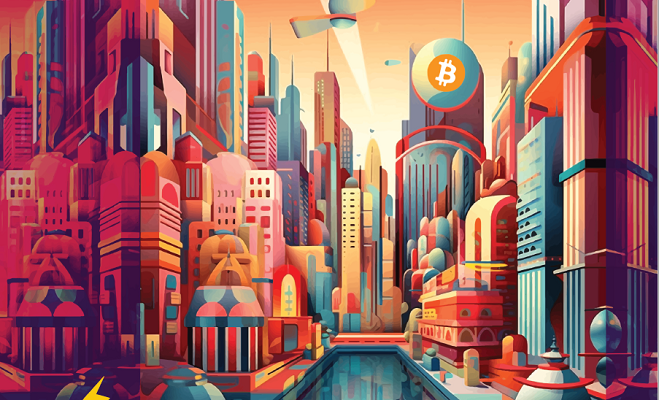Breaking ChatGPT’s Bitcoin FUD #10: Mainstream Acceptance – part 2…

Vlad Costea’s “Breaking FUD” series continues finishes with the 10th “top threat” to Bitcoin according to ChatGPT. Will Bitcoin ever gain mainstream acceptance? Does it matter? Check the second part of Vlad’s thoughts below..
This is a segment from the e-magazine “BTCTKVR 3: Breaking FUD”, released May 2023.
“Breaking ChatGPT’s Bitcoin FUD #10 – part 2: Mainstream AcceptanceADOPTION, MAINSTREAM, EL SALVADOR, LEGAL TENDER
Given how simple it is to use your debit card to set up an account with a centralized BTC exchange, it’s no wonder that most users are stuck in these bona fide banks. However, using a centralized, regulated, and ultimately government compliant custodian defeats the purpose of using Bitcoin. Unless you use your own wallet, with your own full node, and with a certain degree of privacy against your government, you aren’t really free or able to peacefully protest.
The complexity of self-custody is definitely a roadblock on the way to mainstream acceptance. Because using Bitcoin in any other way than with sovereignty is nothing but speculation with a trusted third party in the middle. But those who truly need to use Bitcoin will find all the educational resources they need in order to set themselves free from tyranny of all kinds.
I can argue that the reason why Bitcoin didn’t gain too much mainstream acceptance is given by the relatively prosperous times that people have been living in the developed world, accompanied with a lack of technological means in the underdeveloped world. In between these two extremes, there were people who either decided to speculate or else secure a better future for themselves. The price also plays a major role, but on a long-term scale the volatility points to a massive appreciation against every fiat currency. Even when it’s losing 50% of market valuation against the US dollar, bitcoin still finds itself performing better than failing fiat currencies such as the Argentinian peso, the Turkish lira, and the Nigerian naira.
Education about money and Bitcoin’s place in the grand scheme of the global financial system is important. Having a good understanding of computer science and markets also helps a lot. But in the end, most people adopt Bitcoin because they need to-and if they haven’t yet, then they didn’t urgently need to up to this point.
As every price increase brings in a new wave of speculators, many of them will end up understanding the value proposition of Bitcoin and teaching others about it. As central banks print more money in this Bitcoin-educated environment, the adoption of the decentralized digital currency will grow. And as adoption grows, everything improves – from governments which become more accountable, and all the way to Bitcoin wallets that receive enough feedback to refine user-friendliness.
But let’s stop making excuses, ChatGPT can’t win this one. According to Coin ATM Radar, there are 34,100 Bitcoin ATMs around the world, spread across 75 countries. This means that people from 75 different nations can use their local fiat currency to buy bitcoin, or else sell the bitcoin that they have for instant cash. Except for the US dollar, name another currency that’s so easily accepted and transacted in 75 countries. The metric presented doesn’t even count the thousands of small businesses around the world that accept payments directly in BTC.
Try to travel to East Asia, South America, or Central Africa with euro, British pounds, and bitcoins.
Talk to merchants in marketplaces, go to stores, and ask around to see which one of the three currencies is the fastest to exchange for the country’s official form of money (and therefore, which one is most likely to get accepted as a means of payment). You’re going to be surprised to discover that the demand for bitcoin is second only to the US dollar.
In the West, most of the large retailers didn’t catch up. Which enables bitcoin-friendly third parties such as Bitrefill (who sell gift cards) and ShopInBit (who will sell any legal physical items) to fulfil the roles of Amazon, Steam, Spotify, eBay, PlayStation Store, and lots of other services. There’s definitely a parallel economy which is gradually intersecting with the mainstream one, but it’s probably too early for BTC to be just as omnipresent as the US dollar in commerce.
Sadly, the only two moments which bring spikes in Bitcoin adoption are the massive price pumps that attract speculators and the tragic events that attract people who need Bitcoin as a safety net. But as more time passes, the decentralized digital currency proves its resilience, and the grassroots demand for it increases, mainstream acceptance can only go up. The US dollar didn’t become the dominant currency in 14 years, and neither did gold turn into the world’s most important precious metal overnight. It takes work, it takes persistence, and it takes education.
Nonetheless, given the circumstances, Bitcoin exceeded all expectations, defied the gloomy predictions of all Nobel prizewinning economists, and resisted pressure better than entire governments. In the process, it became more decentralized with every user who embraced sovereignty and it became better known with each person who spread the word about the magic internet money.
Mainstream acceptance is a marathon, not a sprint. And it’s steadily reaching the goal. Sorry, ChatGPT.
SCOREVlad 10
ChatGPT 0″
Vlad has shutout ChatGPT Bitcoin FUD!
I’m Charles Polanski and I seek to turn the Bitcoin-curious into Bitcoin investors and enthusiasts.
Thanks to Vlad for making this excerpt available to freely spread.Find him on Twitter: @TheVladCostea
“Your Bitcoin influencer’s influencer.”
Host of the Bitcoin Takeover Podcast
Writer of the open source @btctkvr mag.
Check out his work: http://linktr.ee/btctkvr
